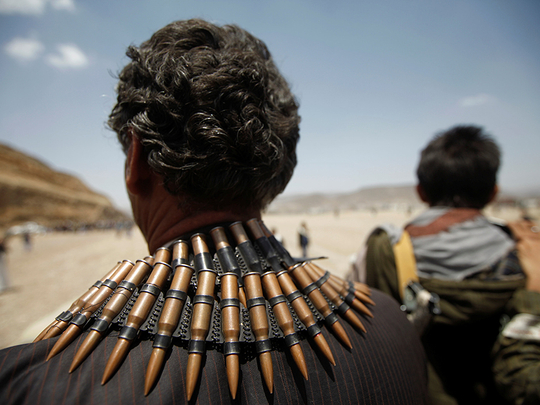
Al Mukalla: The success of peace talks between Yemen’s warring factions in Kuwait depends on the international community’s ability to put pressure on Al Houthis to abide by a UN Security Council resolution and other agreed-on points, analysts and officials said.
“The talks will return to the same endless circle and there are no indications that they would be different or more serious,” Ali Al Fakih, the editor of Al Masder newspaper, told Gulf News.
Yemen factions convened again in Kuwait on the weekend after the Eid break. The current round of peace talks started in April and were aimed at ending more than a year of bloody conflict that killed thousands of people. Government officials previously threatened to boycott the talks if the rebels did not abide by the agenda, which includes rebels pulling out of cities, handing over arms, releasing prisoners and lifting siege to major cities like Taiz.
A Yemeni government official told Gulf News that the delegation agreed to join talks after the Saudis advised Hadi and senior government officials to attend talks as not to be seen as obstructionists to UN peace efforts. “The Saudis have advised us to return to talks or the international community might interpret our protesting move as an obstruction to peace efforts,” the official said on condition of anonymity because he was not authorised to brief reporters. The rebels arrived in Kuwait before the government delegation, unlike in previous rounds.
Al Fakih said that the government returned to Kuwait to “prove its seriousness”.
“The government side has gone back to Kuwait to prove its seriousness in achieving peace and to send a message to the world that the rebel movement are not serious, so the military choice is a suitable alternative to end Al Houthis grab of power,” Al Fakih said.
Since April, negotiations have made very little progress as both sides stuck to their positions. Al Houthis and their allied forces insist on forming a unity government before pulling out of cities under their control. Unconvinced that the rebels would honour their pledges, the internationally recognised government proposed putting into place a UN Security Council resolution that obliges Al Houthis to leave the capital and the other cities and hand over arms to the state.
Despite threatening last week to boycott the peace talks unless the rebels abide by the UN resolution, government officials returned to Kuwait. Mukhtar Al Rahabi, a former aide to president Abd Rabbo Mansour Hadi, told Gulf News on Sunday that the government delegation showed up in Kuwait after receiving a pledge from UN envoy to Yemen Esmail Ould Shaikh Ahmad that he would drop his proposal for the formation of a unity government that would be tasked with handling thorny issues like Al Houthis withdrawal from cities. “There was a ready cooked meal presented in Kuwait.” Al Rahabi said, adding that the proposal irritated Hadi and his government and prompted them into threatening to stay away from talk if the UN envoy did not abandon the proposal.
Al Fakih said: “Al Houthis and Saleh’s delegation rushed to peace talks to buy time in order to achieve military gains on the ground that would forces rival parties to accept a settlement that would legitimise their coup.”












